Key takeaways:
- DevOps culture emphasizes collaboration, breaking down silos between development and operations, and fostering shared responsibility among teams.
- Continuous improvement is central to DevOps, where feedback and learning from failures empower teams to innovate.
- Adopting automation can significantly enhance efficiency, allowing team members to focus on strategic tasks rather than repetitive ones.
- Cultural alignment and open communication are vital for overcoming challenges in implementing DevOps practices successfully.
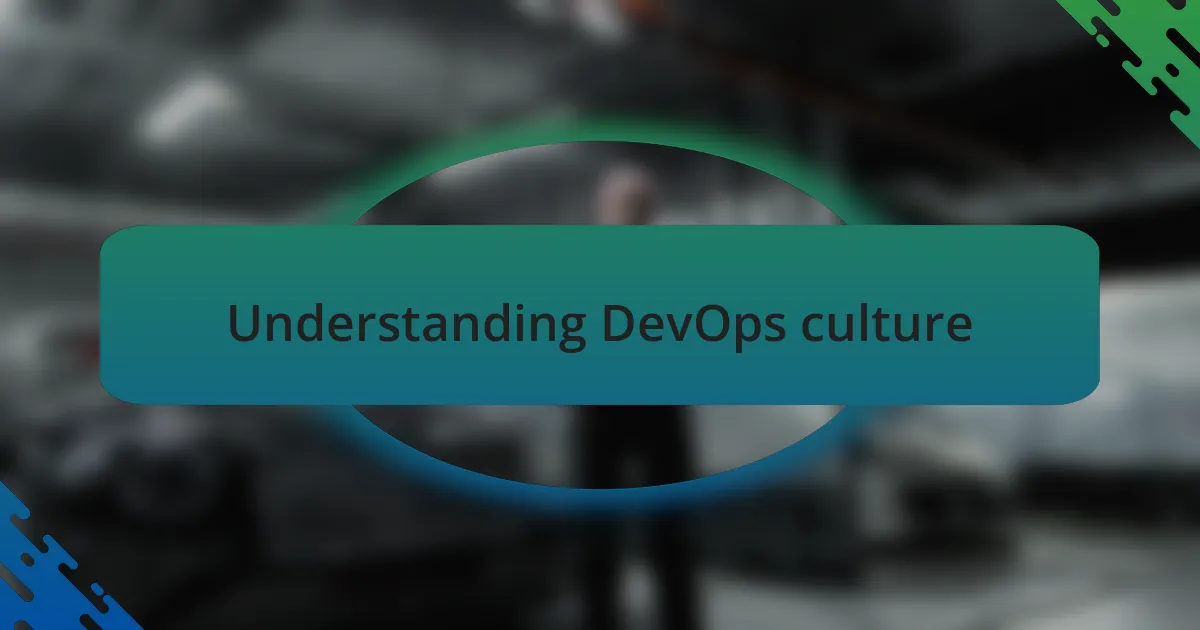
Understanding DevOps culture
DevOps culture is fundamentally about breaking down silos between development and operations teams. In my experience, this collaborative approach fosters a sense of shared responsibility. When everyone feels accountable for the entire lifecycle of a product, it creates powerful synergy—a feeling I vividly recall from a project where transparent communication transformed our workflow.
One of the most striking aspects of DevOps culture is its emphasis on continuous improvement. Have you ever worked in an environment where feedback loops were nonexistent? I have, and it stifled innovation. Transitioning to a DevOps culture means embracing feedback and using failures as opportunities to learn, which has been incredibly empowering for teams I’ve seen thrive in this environment.
Emotional intelligence plays a pivotal role in DevOps. Whenever I reflect on successful collaborative projects, I remember moments when understanding and empathy mitigated potential conflicts. By nurturing a culture where team members feel comfortable expressing their thoughts and ideas, we can create an atmosphere that not only values technical skills but also emotional connection. Isn’t that what fosters true innovation?
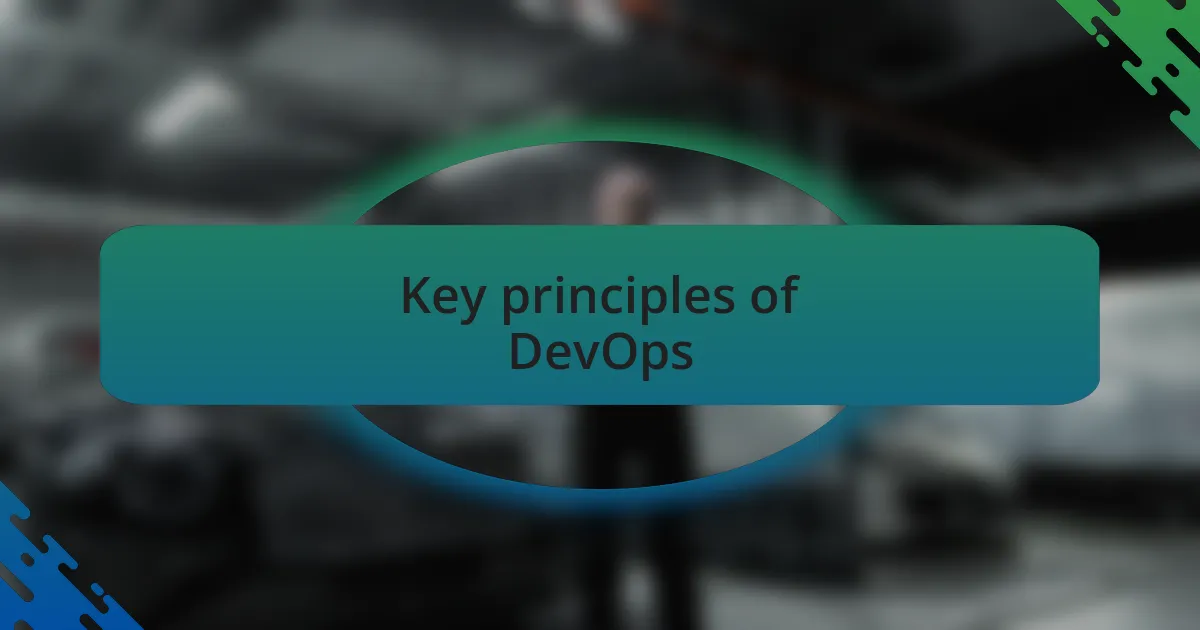
Key principles of DevOps
The key principles of DevOps revolve around collaboration, automation, and measurement. From my observations, collaboration is more than just working alongside one another; it’s about aligning goals and sharing responsibilities across teams. I remember a project where a developer and an operations team member collaborated daily. Their joint efforts led to reduced deployment times, showcasing how teamwork drives efficiency.
Another principle is the automation of repetitive tasks. My first encounter with automation in a DevOps environment was a game-changer. It not only sped up our processes but also allowed team members to focus on more strategic tasks. I often wonder how many valuable hours are wasted on mundane tasks that could easily be automated—embracing this principle has significantly elevated team morale.
Finally, measurement plays a crucial role in DevOps. By analyzing metrics, teams can make informed decisions and continuously improve. I’ve seen firsthand how tracking progress leads to more rewarding outcomes. It provokes the question: without proper metrics, how can we truly gauge our success and adapt our strategies? This principle ensures that every action taken is purposeful and leads to growth.
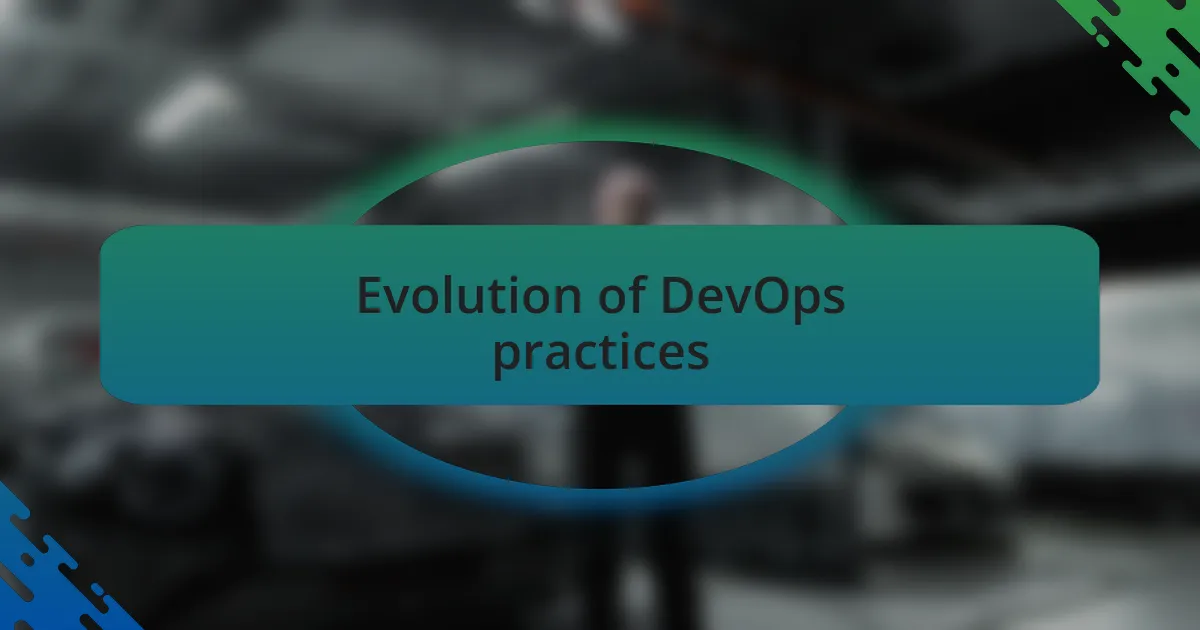
Evolution of DevOps practices
As I’ve navigated the landscape of DevOps, I’ve witnessed its evolution from a niche approach to what it is today—a fundamental aspect of software development. Initially, teams grappled with siloed practices, often leading to disjointed efforts and frustrating delays. I recall a time when our deployments felt like an uphill battle, and simply getting different teams on the same page was exhausting; it made me appreciate how far we’ve come in fostering a culture of collaboration.
Over the years, I’ve noticed a significant shift towards integrating tools that facilitate automation and continuous integration. In one memorable instance, I participated in transitioning our manual testing processes to automated frameworks. The adrenaline rush of seeing our build times shrink dramatically was exhilarating; it was a tangible reminder of the power of embracing change. How many moments do we miss out on because of hesitation to adopt new practices?
Furthermore, the rise of feedback loops has transformed how teams measure success. Reflecting on a project where we implemented real-time monitoring, I found it liberating to access immediate data that guided our adjustments. This practice altered my perception of success—not just as a final product release, but as a continuous journey of improvement. Isn’t it fascinating how an iterative approach can lead to richer, more satisfying outcomes?
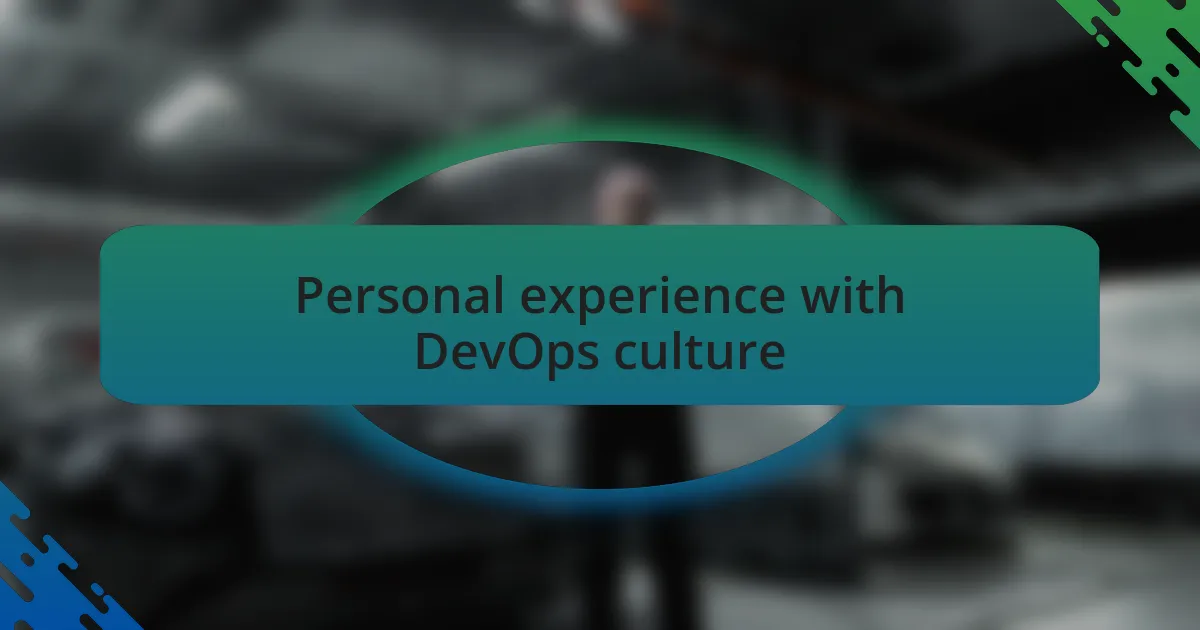
Personal experience with DevOps culture
Embracing DevOps culture has been a transformative experience for me. I remember the first time I collaborating closely with our operations team. The tension that once existed melted away as we stood together during a deployment, sharing insights and troubleshooting issues in real time. It made me realize how vital communication is in ensuring smooth workflows, and I often find myself wondering—how many roadblocks could we eliminate just by talking more?
I also think back to a project where we began to incorporate regular retrospectives. Initially, I was skeptical about sitting down after each sprint to discuss what went well and what didn’t. However, these sessions turned out to be game-changers. They fostered a sense of ownership among team members and sparked genuine conversations about improvement. Reflecting on those discussions, I often wonder if teams truly grasp what can be achieved through open dialogue and mutual respect.
Another defining moment was when we adopted a “fail fast, learn quickly” mindset. I had my reservations, especially when our team faced setbacks with a new deployment. But instead of seeing it as a failure, we used it as a learning opportunity. That shift in perspective not only diminished the fear of failure but also built a stronger bond within the team. How often do we allow fear to hold us back from progress? Embracing this philosophy taught me that sometimes, our greatest lessons come from the most unexpected places.
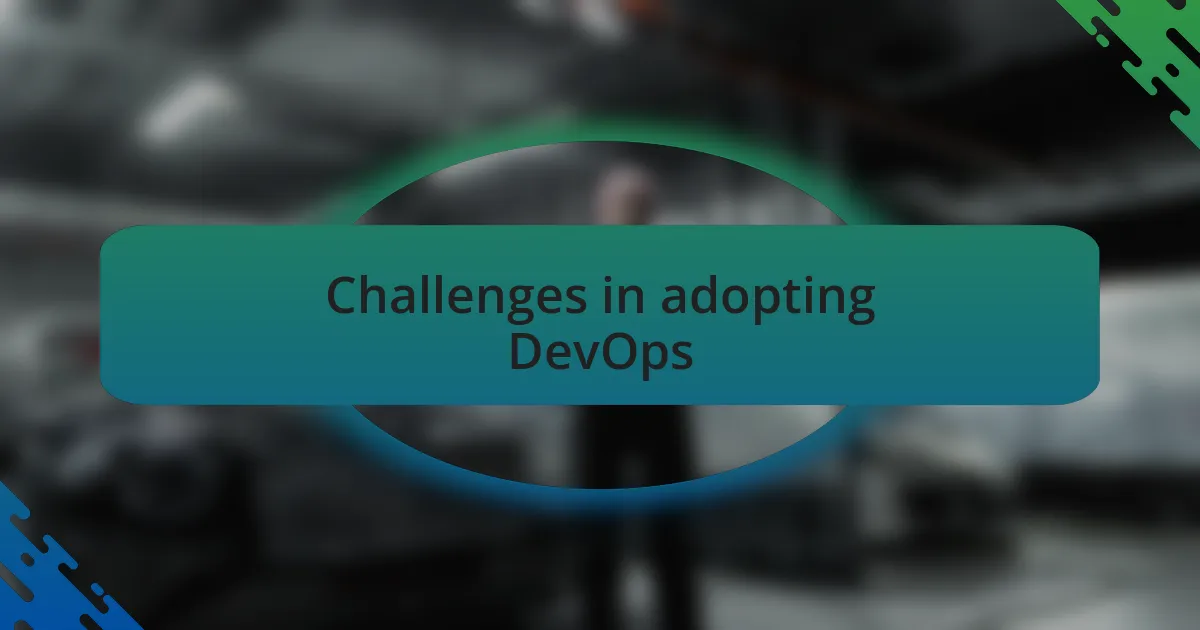
Challenges in adopting DevOps
One of the most significant challenges I encountered while adopting DevOps was the resistance to change among team members. It’s interesting how people can become so accustomed to their ways that even small adjustments feel daunting. I remember a colleague expressing his apprehension about new automation tools, worried they would render his expertise obsolete. Have you ever faced a similar situation? It’s crucial to foster an environment where everyone sees change as an opportunity rather than a threat.
Another obstacle I faced was the integration of tools across teams. Early on, we invested in numerous platforms that promised seamless collaboration but often ended up being too complex. I recall a particular instance where we spent days troubleshooting a seemingly simple deployment issue because tools couldn’t communicate effectively. This experience highlighted the importance of selecting right-sized tools that truly fit the team’s needs without overcomplicating workflows. Ultimately, striking this balance is vital for successful DevOps implementation.
Cultural alignment is yet another hurdle that can’t be ignored. Not everyone shares the same mindset toward collaboration and accountability. I vividly remember late-night brainstorming sessions that devolved into debates about responsibilities. It made me realize how essential it was to cultivate a unified culture, where every team member feels empowered to take ownership. How do we bridge these gaps? By consistently demonstrating shared values and fostering open dialogue, we can create a more cohesive DevOps environment that drives success.
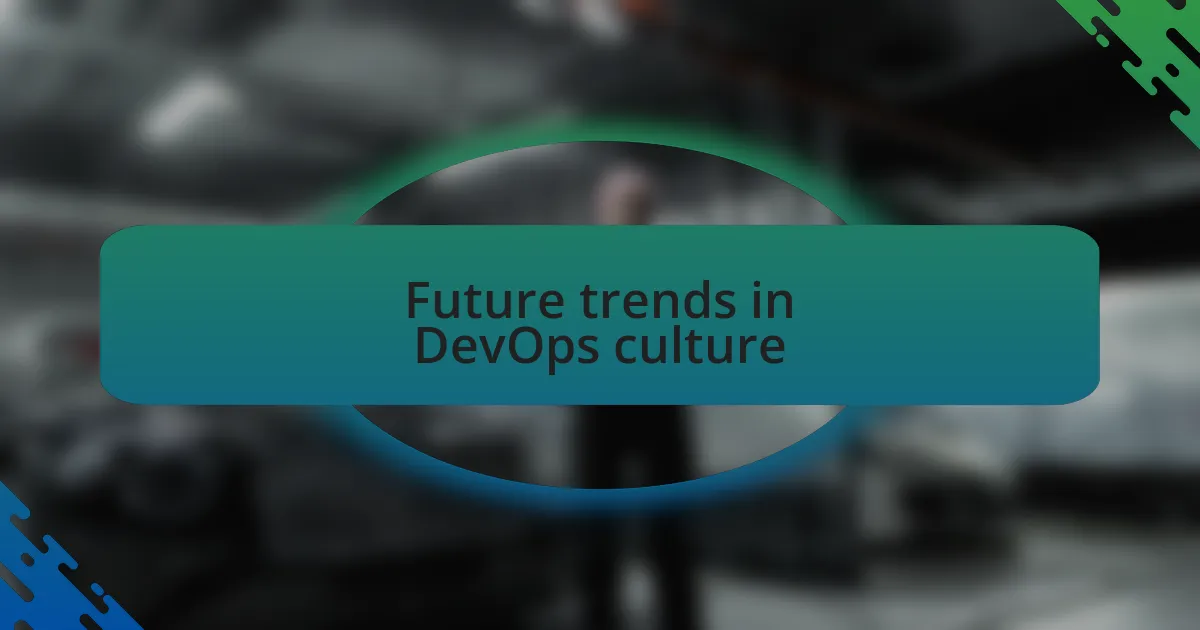
Future trends in DevOps culture
As I look ahead, I can’t help but feel excited about the growing emphasis on automation within DevOps culture. The advancements in AI and machine learning are transforming how we approach deployment and maintenance. I once experienced a breakthrough moment when we implemented AI-driven monitoring tools that drastically reduced our incident response times. Can you imagine the potential for teams to focus more on innovation rather than getting bogged down in routine troubleshooting?
Collaboration tools are evolving rapidly, and I see a future where they become even more integrated. I remember being part of a team that experimented with a new chat platform that seamlessly connected to our code repository. It was a game-changer—notifications about code changes appeared in real-time discussions, enabling us to respond instantly. What if our future collaboration tools could anticipate our needs, suggesting actions before we even realize we need them?
Moreover, the cultural shift towards remote work continues to shape DevOps. I’ve found that working with distributed teams can breed creativity and diverse ideas in unexpected ways. I recall a virtual brainstorming session where geographical diversity led to fresh perspectives on problem-solving—differences became our strengths. What might the future hold as more organizations embrace this shift? I believe that a thriving DevOps culture will increasingly rely on fostering inclusivity and support systems that bridge any gaps between remote team members.